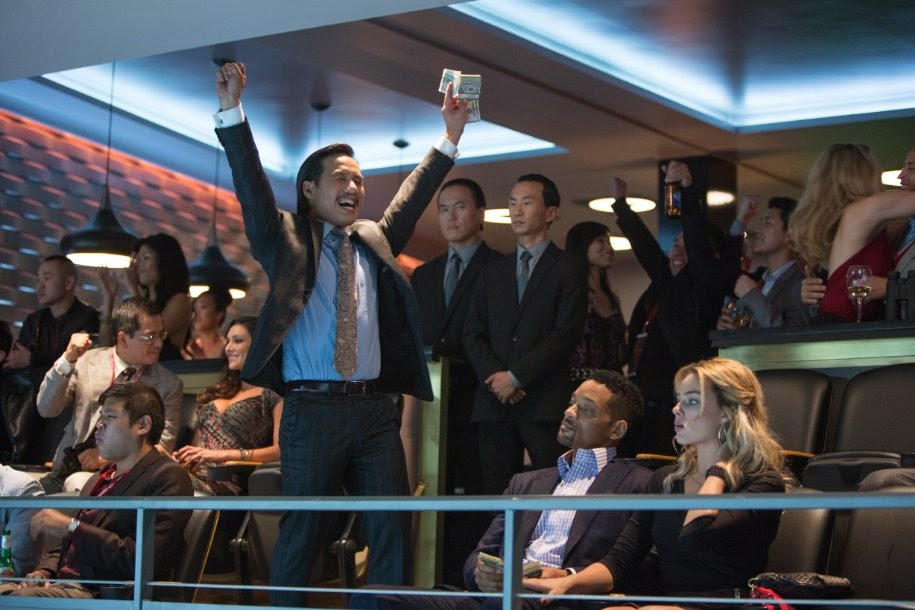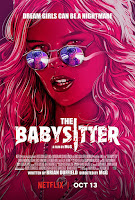The Girl on the Train
The Girl On The Train
(2016)
Directed by: Tate Taylor
Written by: Erin Cressida Wilson,
based on Paula Hawkins' Novel
Starring: Emily Blunt, Luke Evans, Allison Janney
Haley Bennet, Rebecca Ferguson, Justin Theroux
Rating: 14A
Release Date: October 26th, 2016
 |
| Emily Blunt drukenly stumbles through a NYC train station in The Girl on the Train Image Source |
The Girl on the Train, isn't quite a film. It's more of an idea; a premise. Something sketched out in the authors mind, pitched to a studio and created without really exploring, how or why one should do so. I'm assuming that with a title as brilliantly creative as "The Girl on the Train," other alternative titles could have been: "Commuter Girl," "White Girl Wasted," "Drunk Lady Rides Train," or "Emily Blunt Get's Drunk: The Movie." Whatever the title, it seems quite clear that the script for The Girl on the Train probably wasn't written by a human being. It plays like a historical document, created thousands of years in the future, by sentient A.I., trying to simulate what life was really like when humans spent their limited hours drunkenly riding trains, without ever really knowing what humans acted like. It's the 'Uncanny Valley' of movies. It doesn't really have a plot either, just sort of a drunken rambling about an incoherent murder mystery that's never really a mystery in the first place.
The Girl on the Train follows Rachel, (Emily Blunt), a girl, on a train, who is also divorced, damaged, and lonely. She rides in and out of New York everyday, in hopes of fooling everyone she has a job, (albeit she only has one friend, who never pays attention to her anyway). She pays for it through her alimony payments from her ex, Tom, (Justin Theroux), and uses what's left over to buy enough alcohol to black out the entire Russian Navy. On one of her daily rides, while looking out the window for literally 4 seconds, she somehow figures out her old next door neighbor has been sleeping with her ex-husband, now cheating on his new wife, who has a baby Rachel once tried to steal, (in a seen we see multiple times, but doesn't really mean anything in the grand scheme of the whole meaningless story), who doesn't trust her husband or anyone else, especially the au-pair, which is the same next door neighbor, who is actually pregnant but nobody knows who the father is - and then somehow the au-pair is dead in an alley. Sorry, did that seem like a nonsensical, overly complex run on sentence? Because it is, and so is the movie.
Either because the filmmakers don't know how to edit a film, forgot to write a script or are just completely incompetent, they take a straightforward murder mystery and muddle it to the nth degree. All for naught - it becomes painfully obvious who the killer is within seconds of the film unfolding; making it apparent the filmmakers tried to make the film as pseudo-complex as possible to cover up the fact they didn't really have a mystery on their hands; just a good looking episode of "The First 48." The script jumps from present day to years earlier, then back, then months earlier, all for no apparent reason. Filmmakers like Tarantino tend to jump all over the place, and intentionally mix up their timelines. In Pulp Fiction a non-linear timeline worked so well because we could meet characters, see their personal development in different times, and then see how they all react when set upon each other in the same day and time frame. It's brilliant when it's necessary and works to serve the story. In Tate Taylor's film, all the non-linear story does is intentionally confuse the viewer and withhold information that would allow any rational person to figure out the entire story within seconds. It's shoddy and cheap storytelling, that I'm honestly surprised was allowed at this level of filmmaking. However, the writing was on the wall; director Tate Taylor also directed The Help, one of the most backwards, offensive and stupid films I've ever seen, that somehow got away with telling a story that promotes the idea of the "white man's burden." His only half decent credit, Get On Up, was watchable because of a brilliant lead performance, a fascinating subject and a team of talented people working alongside Taylor. Even still, I remarked that Get on Up "doesn't tell a concrete story due to it's fragmented, stream-of-consciousness narrative," an idea that seemingly goes haywire in The Girl on the Train.
Overall, there's not much to write positively about The Girl on the Train; the acting is over the top, the story is infinitely boring, the editing awful, the cinematography drab, and the tone jarring. One minute we're at a party with devilled-eggs at Lisa Kudrow's house, (again, that seems like an important plot point - it isn't), the next minute the film's villain is kicking in the head of a pregnant woman. It's a film that is either boring, or completely disgusting. If you're going to rip off the stunning and intelligent Gone Girl, at least don't make it boring. The only saving grace of the film is Blunt's performance; her performance rides the line between over-the-top and subtlety, thankfully falling on the more subtle side more often than not. Blunt is a fantastic actress with huge range, (Edge of Tomorrow, The Devil Wears Prada and Sicario all feature masterful performances), it's a shame she's the only one who seemed to give a damn about her craft and the industry, in an otherwise cheap, commercial film of a pulpy book, made only to fatten wallets.
In closing, The Girl on the Train is one of the worst films I've seen in the past year; absolutely wasting a talented cast in a film that serves no purpose, has no story to tell, and bores the audience out of their skull. Just watch Gone Girl again; it's the same movie, except actually entertaining. Smashing your kneecaps with a sledgehammer would be a more healthy, interesting and constructive use of your time than spending a moment with The Girl on the Train.
The Girl on the Train follows Rachel, (Emily Blunt), a girl, on a train, who is also divorced, damaged, and lonely. She rides in and out of New York everyday, in hopes of fooling everyone she has a job, (albeit she only has one friend, who never pays attention to her anyway). She pays for it through her alimony payments from her ex, Tom, (Justin Theroux), and uses what's left over to buy enough alcohol to black out the entire Russian Navy. On one of her daily rides, while looking out the window for literally 4 seconds, she somehow figures out her old next door neighbor has been sleeping with her ex-husband, now cheating on his new wife, who has a baby Rachel once tried to steal, (in a seen we see multiple times, but doesn't really mean anything in the grand scheme of the whole meaningless story), who doesn't trust her husband or anyone else, especially the au-pair, which is the same next door neighbor, who is actually pregnant but nobody knows who the father is - and then somehow the au-pair is dead in an alley. Sorry, did that seem like a nonsensical, overly complex run on sentence? Because it is, and so is the movie.
Either because the filmmakers don't know how to edit a film, forgot to write a script or are just completely incompetent, they take a straightforward murder mystery and muddle it to the nth degree. All for naught - it becomes painfully obvious who the killer is within seconds of the film unfolding; making it apparent the filmmakers tried to make the film as pseudo-complex as possible to cover up the fact they didn't really have a mystery on their hands; just a good looking episode of "The First 48." The script jumps from present day to years earlier, then back, then months earlier, all for no apparent reason. Filmmakers like Tarantino tend to jump all over the place, and intentionally mix up their timelines. In Pulp Fiction a non-linear timeline worked so well because we could meet characters, see their personal development in different times, and then see how they all react when set upon each other in the same day and time frame. It's brilliant when it's necessary and works to serve the story. In Tate Taylor's film, all the non-linear story does is intentionally confuse the viewer and withhold information that would allow any rational person to figure out the entire story within seconds. It's shoddy and cheap storytelling, that I'm honestly surprised was allowed at this level of filmmaking. However, the writing was on the wall; director Tate Taylor also directed The Help, one of the most backwards, offensive and stupid films I've ever seen, that somehow got away with telling a story that promotes the idea of the "white man's burden." His only half decent credit, Get On Up, was watchable because of a brilliant lead performance, a fascinating subject and a team of talented people working alongside Taylor. Even still, I remarked that Get on Up "doesn't tell a concrete story due to it's fragmented, stream-of-consciousness narrative," an idea that seemingly goes haywire in The Girl on the Train.
Overall, there's not much to write positively about The Girl on the Train; the acting is over the top, the story is infinitely boring, the editing awful, the cinematography drab, and the tone jarring. One minute we're at a party with devilled-eggs at Lisa Kudrow's house, (again, that seems like an important plot point - it isn't), the next minute the film's villain is kicking in the head of a pregnant woman. It's a film that is either boring, or completely disgusting. If you're going to rip off the stunning and intelligent Gone Girl, at least don't make it boring. The only saving grace of the film is Blunt's performance; her performance rides the line between over-the-top and subtlety, thankfully falling on the more subtle side more often than not. Blunt is a fantastic actress with huge range, (Edge of Tomorrow, The Devil Wears Prada and Sicario all feature masterful performances), it's a shame she's the only one who seemed to give a damn about her craft and the industry, in an otherwise cheap, commercial film of a pulpy book, made only to fatten wallets.
In closing, The Girl on the Train is one of the worst films I've seen in the past year; absolutely wasting a talented cast in a film that serves no purpose, has no story to tell, and bores the audience out of their skull. Just watch Gone Girl again; it's the same movie, except actually entertaining. Smashing your kneecaps with a sledgehammer would be a more healthy, interesting and constructive use of your time than spending a moment with The Girl on the Train.
GRANT'S RATING 1/5 STARS
Rebecca Ferguson and Justin Theroux do their best impression of human beings in The Girl on the Train



Comments